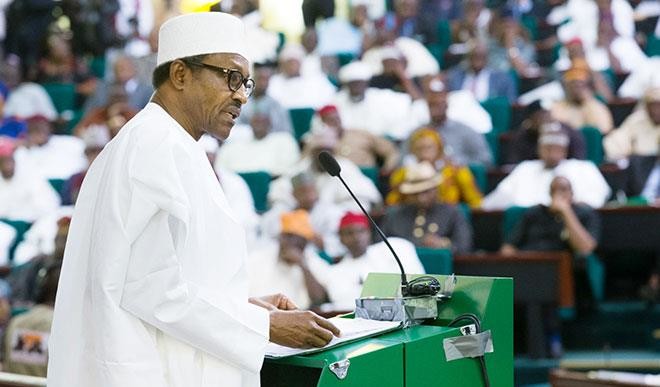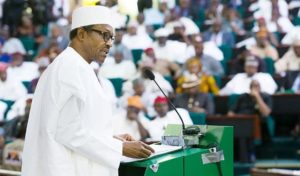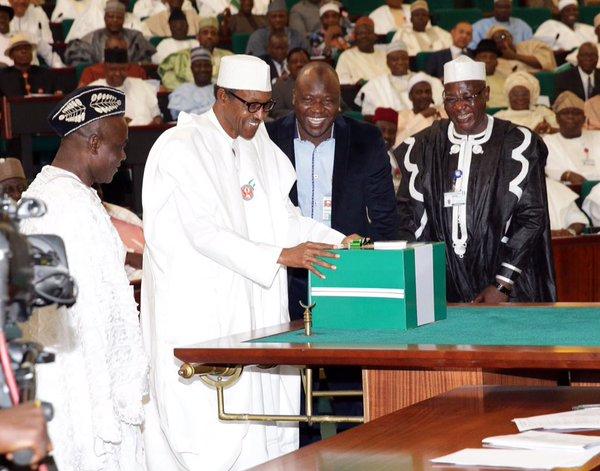Economy
2016 Budget: MDAs in Non-Implementation Mess


By Dipo Olowookere
Barely one month to the implementation of the capital budget for 2016, several Ministries Departments and Agencies (MDAs) are yet to come to terms with the current economic recession by not implementing the capital budget to the letter and spirit of the 2016 Appropriation Act as passed by the National Assembly, Economic Confidential can report authoritatively.
Foremost among the Ministries is the Ministry of Budget and National Planning with the highest allocation of N1.14 trillion, having a capital vote of N404.86 billion and a recurrent expenditure of N142.40bn but nothing to show at the time of writing this report.
Recall that the capital budget is more than the total budget for Agriculture, Health, Youth and Sports combined!
Facts reaching Economic Confidential reveals that the department of Monitoring and Evaluation of the ministry have been busy inspecting almost completed projects initiated by the Goodluck Jonathan administration, while those initiated by the current administration are yet to take off, says an official who pleaded anonymity, despite the fact that they were captured in the 2016 budget Act.
Other Ministries who have shown lacklustre attitude to the implementation of the capital projects for 2016 budget are Ministry of Interior with a whopping N513.65 billion and N61.71bn for capital projects and a recurrent expenditure of N451.94bn.
As for Interior Ministry, no appreciable progress has been made as what goes on there is business as usual. This is closely followed by the ministry of Education with N480.27bn, and a capital budget of N35.43bn and a recurrent expenditure of N444.84bn.
Even though arrangements were made in the 2016 appropriation Act to settle the Academic Staff Union of Universities (ASUU), the respective federal government Universities are yet to receive such monies, thereby paving way for imminent industrial action by the universities lecturers, which had in the past paralyzed the educational system in the country.
The same cannot be said about the ministry of Power, Works and Housing as it has followed up with project initiation and implementation.
With a budget of N456.93 billion for 2016 and a capital allocation of N422.96 billion, the ministry has embarked upon several projects, which if completed, would impact positively on the lives of Nigerians, notably the roads.
The Ministry of Defence is rated number five in the allocation of 2016 budget as it garnered a total of N443.07bn with a capital budget of N130.86 bn.
The ministry has been grappling with projects in the three formations of the armed forces, namely the Army, Navy and the Air Force as the releases are not coming as and when due.
Health Ministry is number six in the allocation of budget for 2016 with N250bn.
With the much mouthed taking care of maternal and child mortality, HIV/AIDS pandemic and Primary Health Care across the country, a capital allocation of N28.65billion was granted to the ministry.
Apart from the current rehabilitation of the Nnamdi Azikiwe International Airport, Abuja which had prompted the redirection of all flights to Kaduna, no meaningful projects have been embarked upon by the Ministry of Transportation.
Meanwhile, a total budget of N202.34bn was allocated in 2016 with a capital expenditure of N188.67bn and a recurrent of N13.66bn.
The Ministry becomes number seven in the highest allocation for 2016. The office of the National Security Adviser where all security pools are hosted had a total budget of N88.87bn with a capital allocation of N32.08bn, becomes the number eight of all MDAs with a recurrent expenditure of N56.79bn.
Findings equally show that no meaningful project has been embarked upon by the office as far as budget implementation is concerned. Agriculture, Youth and Sports each have a budget of N75.97bn and N75.47bn respectively.
They are tagged numbers 9 and 10. While the capital allocation for Agric Ministry stands at N46.17bn, the youth and Sports counterpart has N4.66bn, with a recurrent of N70.81 bn.
The ministry that has the least allocation is Special Duties with N65 million for 2016 and designated at the Secretary to the Government of the Federation.
It has no capital vote for 2016. Economic Confidential recalls that the thrust of the 2016 budget was the recovery and revitalization of the economy to take it out of recession, but the activities of most MDAs are a far cry from what is envisaged.
http://economicconfidential.com/2017/02/budget-2016-mdas-implementation/
Economy
Tinubu Okays Extension of Ban on Raw Shea Nut Export by One Year

By Aduragbemi Omiyale
The ban on the export of raw shea nuts from Nigeria has been extended by one year by President Bola Tinubu.
A statement from the Special Adviser to the President on Information and Strategy, Mr Bayo Onanuga, on Wednesday disclosed that the ban is now till February 25, 2027.
It was emphasised that this decision underscores the administration’s commitment to advancing industrial development, strengthening domestic value addition, and supporting the objectives of the Renewed Hope Agenda.
The ban aims to deepen processing capacity within Nigeria, enhance livelihoods in shea-producing communities, and promote the growth of Nigerian exports anchored on value-added products, the statement noted.
To further these objectives, President Tinubu has authorised the two Ministers of the Federal Ministry of Industry, Trade and Investment, and the Presidential Food Security Coordination Unit (PFSCU), to coordinate the implementation of a unified, evidence-based national framework that aligns industrialisation, trade, and investment priorities across the shea nut value chain.
He also approved the adoption of an export framework established by the Nigerian Commodity Exchange (NCX) and the withdrawal of all waivers allowing the direct export of raw shea nuts.
The President directed that any excess supply of raw shea nuts should be exported exclusively through the NCX framework, in accordance with the approved guidelines.
Additionally, he directed the Federal Ministry of Finance to provide access to a dedicated NESS Support Window to enable the Federal Ministry of Industry, Trade and Investment to pilot a Livelihood Finance Mechanism to strengthen production and processing capacity.
Shea nuts, the oil-rich fruits from the shea tree common in the Savanna belt of Nigeria, are the raw material for shea butter, renowned for its moisturising, anti-inflammatory, and antioxidant properties. The extracted butter is a principal ingredient in cosmetics for skin and hair, as well as in edible cooking oil. The Federal Government encourages processing shea nuts into butter locally, as butter fetches between 10 and 20 times the price of the raw nuts.
The federal government said it remains committed to policies that promote inclusive growth, local manufacturing and position Nigeria as a competitive participant in global agricultural value chains.
Economy
NASD Bourse Rebounds as Unlisted Security Index Rises 1.27%

By Adedapo Adesanya
The NASD Over-the-Counter (OTC) Securities Exchange expanded for the first session this week by 1.27 per cent on Wednesday, February 25.
This lifted the NASD Unlisted Security Index (NSI) above 4,000 points, with a 50.45-point addition to close at 4,025.25 points compared with the previous day’s 3,974.80 points, as the market capitalisation added N30.19 billion to close at N2.408 trillion versus Tuesday’s N2.378 trillion.
At the trading session, FrieslandCampina Wamco Nigeria Plc grew by N5.00 to trade at N100.00 per share compared with the previous day’s N95.00 per share, Central Securities Clearing System (CSCS) Plc improved by N4.18 to sell at N70.00 per unit versus N65.82 per unit, and First Trust Mortgage Bank Plc increased by 14 Kobo to trade at N1.59 per share compared with the previous day’s N1.45 per share.
However, the share price of Geo-Fluids Plc depreciated by 27 Kobo at midweek to close at N3.27 per unit, in contrast to the N3.30 per unit it was transacted a day earlier.
At the midweek session, the volume of securities went down by 25.3 per cent to 8.7 million units from 11.6 million units, the value of securities decreased by 92.5 per cent to N80.7 million from N1.2 billion, and the number of deals slipped by 33.3 per cent to 32 deals from the preceding session’s 48 deals.
At the close of business, CSCS Plc remained the most traded stock by value on a year-to-date basis with 34.1 million units exchanged for N2.0 billion, trailed by Okitipupa Plc with 6.3 million units traded for N1.1 billion, and Geo-Fluids Plc with 122.0 million units valued at N478.0 million.
Resourcery Plc ended the trading session as the most traded stock by volume on a year-to-date basis with 1.05 billion units valued at N408.7 million, followed by Geo-Fluids Plc with 122.0 million units sold for N478.0 million, and CSCS Plc with 34.1 million units worth N2.0 billion.
Economy
Investors Lose N73bn as Bears Tighten Grip on Stock Exchange

By Dipo Olowookere
The bears consolidated their dominance on the Nigerian Exchange (NGX) Limited on Wednesday, inflicting an additional 0.09 per cent cut on the market.
At midweek, the market capitalisation of the domestic stock exchange went down by N73 billion to N124.754 trillion from the preceding day’s N124.827 trillion, and the All-Share Index (ASI) slipped by 114.32 points to 194,370.20 points from 194,484.52 points.
A look at the sectoral performance showed that only the consumer goods index closed in green, gaining 1.19 per cent due to buying pressure.
However, sustained profit-taking weakened the insurance space by 3.79 per cent, the banking index slumped by 2.07 per cent, the energy counter went down by 0.24 per cent, and the industrial goods sector shrank by 0.22 per cent.
Business Post reports that 25 equities ended on the gainers’ chart, and 54 equities finished on the losers’ table, representing a negative market breadth index and weak investor sentiment.
RT Briscoe lost 10.00 per cent to sell for N10.35, ABC Transport crashed by 10.00 per cent to N6.75, SAHCO depreciated by 9.98 per cent to N139.35, Haldane McCall gave up 9.93 per cent to trade at N3.99, and Vitafoam Nigeria decreased by 9.93 per cent to N112.50.
Conversely, Jaiz Bank gained 9.95 per cent to settle at N14.03, Okomu Oil appreciated by 9.93 per cent to N1,765.00, Trans-nationwide Express chalked up 9.77 per cent to close at N2.36, Fortis Global Insurance moved up by 9.72 per cent to 79 Kobo, and Champion Breweries rose by 5.39 per cent to N17.60.
Yesterday, 1.4 billion shares worth N46.2 billion were transacted in 70,222 deals compared with the 1.1 billion shares valued at N53.4 billion traded in 72,218 deals a day earlier, implying a rise in the trading volume by 27.27 per cent, and a decline in the trading value and number of deals by 13.48 per cent and 2.76 per cent, respectively.
Fortis Global Insurance ended the session as the busiest stock after trading 193.7 million units for N152.7 million, Zenith Bank transacted 120.7 million units worth N11.1 billion, Japaul exchanged 114.8 million units valued at N407.0 million, Ellah Lakes sold 98.4 million units worth N999.2 million, and Access Holdings traded 63.1 million units valued at N1.7 billion.
-

 Feature/OPED6 years ago
Feature/OPED6 years agoDavos was Different this year
-
Travel/Tourism10 years ago
Lagos Seals Western Lodge Hotel In Ikorodu
-

 Showbiz3 years ago
Showbiz3 years agoEstranged Lover Releases Videos of Empress Njamah Bathing
-

 Banking8 years ago
Banking8 years agoSort Codes of GTBank Branches in Nigeria
-

 Economy3 years ago
Economy3 years agoSubsidy Removal: CNG at N130 Per Litre Cheaper Than Petrol—IPMAN
-

 Banking3 years ago
Banking3 years agoSort Codes of UBA Branches in Nigeria
-

 Banking3 years ago
Banking3 years agoFirst Bank Announces Planned Downtime
-

 Sports3 years ago
Sports3 years agoHighest Paid Nigerian Footballer – How Much Do Nigerian Footballers Earn














